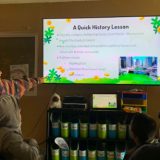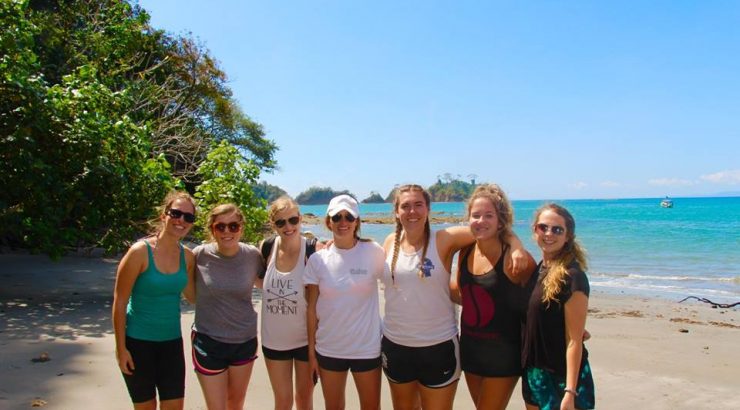
Peace Communication in Costa Rica My Interterm 2017 travel course experience!
July 17, 2017
During my sophomore year (2015-2016), my academic adviser told me that, because of adding a second major at the start of the year, I was unable to study abroad. Since that was at the very top of my college bucket list, I was heartbroken. However, it was only a week later friends reminded me of the Interterm travel courses offered, and just like that my hope was restored.
In one of my meetings with my academic mentor, Dr. LaBelle, she mentioned she was in the process of creating a travel course for the following year in conjunction with the Peace Studies Department. She discussed the idea with our SCC 100 & SCC 295 classes to hear students’ feedback about the idea of an interdisciplinary travel course. Immediately, the excitement started to build around the possibility of a travel course for SCC students!
As fate would have it, come Interterm 2017, I was headed to Costa Rica! The course kicked off with two days on Chapman’s campus, where both graduate and undergraduate students presented on a topic relevant to their majors. Graduate students presented ideas rooted in Costa Rican culture that applied to their area of study (e.g., the demilitarization of Costa Rica in 1948), and undergraduate students presented on fundamental topics of their majors. The SCC majors in the class presented on something we discuss a lot in our classes: an assessment of an organization’s strengths, weaknesses, threats, and opportunities in regard to achieving a particular goal (i.e., a SWOT analysis). Other groups presented on nonviolent resistance, restorative justice, and justice and peace in Costa Rica. By the end of those two days, we had received a crash-course of Peace Studies and Strategic & Corporate Communication. We said our goodbyes and promised to meet up as a class in a different country!
Our time in Costa Rica was a whirlwind, as any inaugural Interterm course would be (and I say that in the best way possible). The purpose of the trip was to learn about strategies for peace communication, and to visit various types of organizations to learn about the ways that they achieve peace, sustainability, and/or social justice. As SCC majors, we also focused a lot on how these organizations communicate their mission within the local community (both how they do this well, and how we think it could be improved based on theory and research in our field). Our itinerary for the trip consisted of split time on campus at the University of Peace (a UN sanctioned international school dedicated to teach world leaders and educators the principles of peace) and on-site at organizations in the community.

At the University of Peace!
We studied at the University of Peace to begin and end our trip in Costa Rica. Upon arrival, we were introduced to our “teachers,” Hannah & Julia, both American teachers who were passionate about peace and Costa Rica! Julia was our in-class instructor and University of Peace liaison, and Hannah was our chaperone for the trip. In the University of Peace classes, we were educated on the history of Costa Rica, environmental efforts gaining traction in the country, and government relations with nonprofit organizations, amongst many other in-depth topics related to peace. Some of these were even taught to us in Spanish, which had to be translated by Hannah!
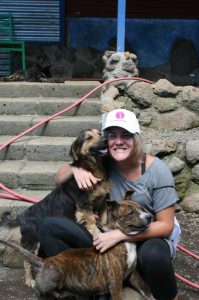
Me in my personal heaven, aka Land of the Strays
When we weren’t on campus at the University of Peace, we were in various cities throughout Costa Rica. In those cities, we sat down with instrumental leaders of various nonprofits and they told us their story and purpose, and explained how they hoped to impact their town. After our Q & A sessions, our class would get hands on experiences in the communities while we were shown a day in the life of people living there. For example, when we were at Las Tarcoles, a fishing community who provided fresh fish to local markets, we learned about the different types of fish they caught and the various fishing regulations imposed by the government that affected what and where they fished. We then were carted off in groups on small boats and attempted to fish (surprisingly I caught one!) and then were shown a remote island where we got to swim in the ocean! Upon arrival back in the community, we had lunch and got to eat the fish we had caught! All of our days in various towns followed that execution, whether it was at Land of the Strays where 700 stray dogs roamed free as we hiked through hills with them, or in squatter communities where we learned the educational and personal impact a nonprofit had on the children and families there.
This trip made me realize how important SCC is, structurally and academically. Structurally, I learned that the concepts I’m learning in class and the required classes I have to take could have been valuable assets in the creation of the nonprofits we visited. I was shown the importance of strategic messaging time and again, and repeatedly reminded of how important it is to select the right channel to reach your intended target audience. Academically, I realized how applicable my major is to these organizations and their structure, optimization, and production. I now know that the classes I’m taking in risk & crisis communication, intercultural communication, and organizational communication are all important, and was able to see the lessons taught in those classes apply to real life scenarios in Costa Rica. I also loved seeing how similar messages and campaign principles were applied to various campaigns! As said by Dr. LaBelle in discussing the course, “There are so many campaigns in Costa Rica that are honestly just inspiring- imagine, government funded education and health programs that work and have complete community buy in! This is a great opportunity for our students to meet with a United Nations mandated University for Peace in Costa Rica, and to see how the concepts we teach come to life in an international context.” It was exciting to see how my major worked in the real world, outside of academic framework and hypothetical examples in class. That reassurance was a true highlight of my time in Costa Rica, especially because as I start to look for jobs post-graduation, I know what I can contribute to an organization as an SCC major!
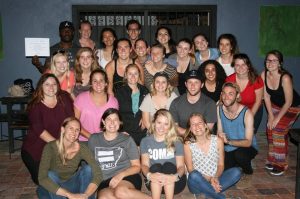
The women who made this trip possible: (bottom row, from left to right): Julia, Dr. Leitz, Dr. LaBelle, & Hannah
Aside from the academic benefits, this trip opened myself and fellow students to the reality of our privilege. Living and studying in Orange County, there are very rarely glaring contrasts to the privilege we are afforded every day. I know finally stepping outside of the Orange County bubble was a reality I had to face. I was reminded of how fortunate I am to be studying where I am and living where I do. This trip opened my eyes to the sense of responsibility that comes with privilege. This duty largely rests in making a change in my local community where I can.
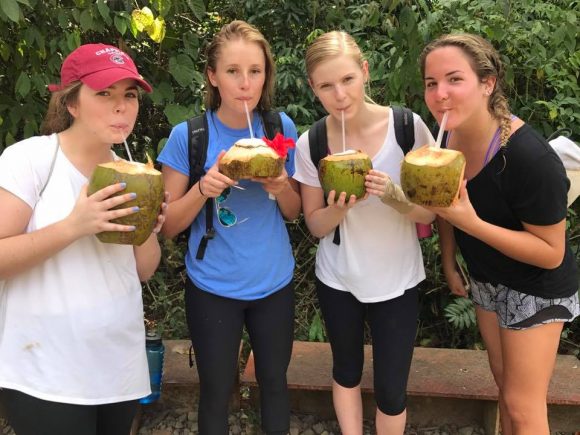
The 4 SCC students sippin’ on coconuts because did you really go to Costa Rica if you didn’t drink from a coconut after hiking through a rain forest??
If anyone reading this post is like me, and is unable to study abroad, I promise you the 12 days spent in Costa Rica is so immersive, you feel as if you were there for a full four months! Interterm is such a unique opportunity for Chapman students, period. Being able to travel like this is an opportunity I encourage you to take!! This trip opened my eyes in so many ways. I will forever be grateful that Dr. LaBelle, Dr. Leitz, Hannah, and Julia were able to provide such an enriching and life-changing experience for our class. If you or anyone you know is interested in going on this trip, Dr. Janicke-Bowles & Dr. Leitz are taking another class to Costa Rica over Interterm 2019! Preliminary applications are now open (here), or you can learn more about the course on the CGE website. Feel free to email Dr.Janicke-Bowles for more information at bowles@chapman.edu as well!

